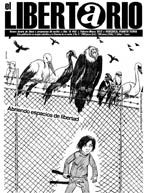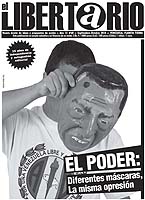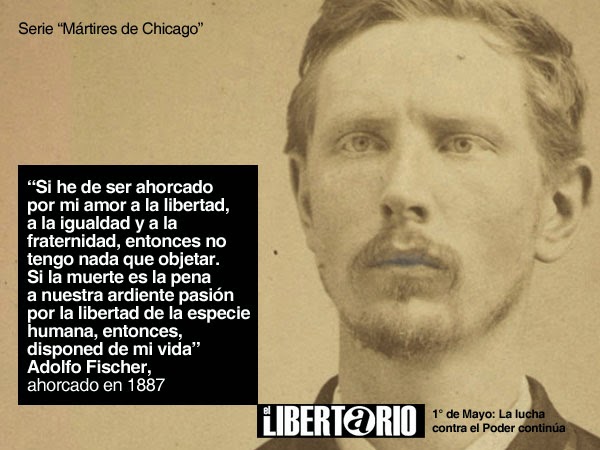El Libertario' newsroom
[Note by El Libertario: given
the demand for alternative information on the current situation in Venezuela in
English, are the two texts that follow.]
::Twelve F.A.Q. about what is happening in Venezuela
El Libertario newspaper
1) Are the protests in Venezuela led by opposition parties on the right?
- No. The current wave of
protests began in the city of San Cristobal (Tachira) on Feb. 4 when students
denouncing security issues on the university campus were met with repression
and several were jailed. The consequent protests focused on liberating the
detained students, spread to other cities and were also met with repression,
intensifying student unrest. It was in this context that a faction of the
opposition launched a proposal for street demonstrations dubbed “La Salida” to
demand President Maduro’s resignation, while another faction opposed the idea
of street demonstrations focused on this larger, single demand. Despite the
arrest of the conservative politician Leopoldo Lopez, the widespread protests
all over the country have overwhelmed and “surpassed on the left” the
opposition political parties.
2) Are the protests in Venezuela part of a coup against Maduro’s
government?
- In Venezuela, a country with a history of military coups, there is
always some possibility that events will take that turn. However, the current
situation is very different from 2002 when Hugo Chavez was temporarily taken
out of power by a coup. After that date, the armed forces were politically
cleansed at high and middle ranks; those who filled the open positions were
ideologically committed to the government and further secured by receiving a
free charter to control various country businesses. The most likely source of a coup today in
Venezuela is one Chavista faction or another. Their aim would be to ensure the
country’s governability so that the military along with energy transnationals
may continue to operate successfully in the country.
3) Are the protests connected to a “conspiracy” on the part of private
media networks in Venezuela?
- Today, broadcasting stations have been silenced by the government of
Nicolas Maduro. The last nationwide network, Globovision, was bought by an
entrepreneur with ties to the government, who modified its informational
approach. Radio stations and newspapers are being pressured to not report on
the protests based on the argument that doing so incites “violence.” In addition, print media suffers from a lack
of paper due to the controls on foreign currency exchange imposed by the
government. For this reason, protestors have taken responsibility for
generating their own reports, making extensive use of social media networks.
4) Are the protests’ only aim to oust President Nicolas Maduro from
power?
- This is a movement without a center, and there are many demands. To sum them up, there are two agendas: one
from Caracas and one from the cities in the interior of the country. From Caracas,
the majority demands are the President’s resignation, the liberation of
political prisoners, and the rejection of violence. From the other cities,
which have suffered extremely for years from the interruption of public
services and the scarcity of basic goods, the problems of soaring inflation,
scarcity, and lack of water and electricity are also a central majority
focus.
5) Are the protests limited only to the middle class?
- In Caracas, the majority of protestors are middle class people and students
from public and private universities. In the interior of the country, the
situation is completely different and many in the popular sectors take an
active part in the protests.
6) Are the images that have been circulating of repressive acts in
Venezuela all false?
- There are some who have maliciously or innocently spread images and
videos that do not correspond to current events in Venezuela, but social media
networks have proven to be very good at self-regulation and have successfully
denounced these as false and educated users on how to verify information before
sharing it. The government’s strategy has been to “attempt to show” that since
3, 4, or even 10 images are false, all the others are also. But the facts are
there, recorded through the technological devices of dozens of witnesses of the
government’s repression.
7) If it isn’t the political parties, then who’s organizing the protests
in Venezuela?
- In the end, the political parties have had to join in on the protests
and have tried—up to now unsuccessfully—to channel them. For example, the Mesa
de la Unidad Democratica (MUD) called for three days free of demonstrations
after February 12 for mourning, and people disobeyed, continuing on the
streets. Many launch initiatives through
social media networks; some are picked up and go viral; others fall on deaf
ears and are forgotten.
8) If Nicolas Maduro resigns, will Venezuela return to its past state of
affairs before Chávez?
- No. First, in the case that should happen, it is impossible to turn
back the achievements regarding progressive rights established by the
Constitution and internationally backed. Second, it is impossible that, as some
believe, the “opposition”—whatever we understand that to mean—will oust
“chavismo” from “power”—in the broadest meaning of that term. The Bolivarian
movement has a broad base that, regardless of how the protests end up, will
continue figuring centrally in Venezuelan politics in the near and not so near
future.
9) What is happening with political repression in Venezuela now?
- As of this date, there have been 11 deaths related to the
demonstrations, the majority a direct result of repressive units. An estimated 400 people have been detained
for participating in the protests. Just in Caracas, according to counts from
the human rights center of the Catholic University DDHH, 197 have been
released, 7 remain detained, 6 are disappeared or unaccounted for, 8 have been
deprived of liberty by court sentence.
10) Who is repressing the protests in Venezuela?
- Mainly the Bolivarian National Guard (GNB), the Bolivarian National
Intelligence Service (SEBIN), and paramilitary groups indirectly funded and
openly encouraged by the government.
11) What role does US imperialism play in Venezuela?
- President Barack Obama and the State Department publicly condemned the
restriction of democratic liberties in Venezuela. This led Nicolas Maduro and
his followers to accuse them of meddling in the internal affairs of another
country and violating Venezuela’s sovereignty.
Despite insisting that the US is behind the protests, Maduro has also
invited the North American government to reestablish diplomatic relations between
the two countries. On the other hand, Chevron continues to have many productive
business deals in Venezuelan territory in the areas of gas and oil exploitation
through contracts signed by President Chávez that are good for another 30 or 40
years. The US continues to be Venezuela’s greatest “commercial ally.” Venezuela
sends its largest quota of exported energy to the US and in turn imports many
products from the US to address the country’s scarcity problems. Finally,
Maduro’s government revoked CNN’s working credentials, accusing the network of
“violating Venezuelan laws,” only to renew them 24 hours later, inviting CNN to
return to the country. The governments of other countries in the region have
also expressed either support or concern regarding the situation in Venezuela.
12) What is the role of social movements in Venezuela at this
juncture?
- During the last 15 years social movements have suffered from a policy
of active state intervention that has diminished and divided them and often
resulted in their being coopted. Lamentably,
the few groups that have persevered with some degree of autonomy—for example a
few labor unions—are too weak to have any real impact on the current situation.
Latest information on the situation in Venezuela (in Spanish):
http://periodicoellibertario.blogspot.com
Information about Venezuela, from a radical and alternative approach, in
English and other languages: www.nodo50.org/ellibertario
Periodico El Libertario
ellibertario@nodo50.org -
ellibertario@hotmail.com
@pelibertario
www.facebook.com/ellibertario
****************************************************************
::Express summary of Venezuela’s situation for curious
people and/or the poorly informed
Rafael Uzcategui [from El
Libertario newspaper]
On February 4th, 2014, students from the Universidad Nacional
Experimental del Tachira (Experimental University of Tachira), located on an
inland state of the country, protested due to the sexual assault of a fellow
female classmate in lieu of the current insecurity situation of the city. The
protest was repressed, and several students were detained.
The next day, other universities around the country had their own
protests requesting the release of these detainees, being at the same time
repressed and some of them incarcerated. The wave of indignation had the
context of the economic crisis, the shortage of first necessity items and the
crisis of basics public services, as well as the beginning of the enforcement
of an economic plan on behalf of the President Nicolas Maduro.
Two opposing politicians, Leopoldo Lopez, and Maria Corina Machado,
tried to capitalize on the wave of discontent rallying for new protests under
the slogan “The Way Out” and try to pressure for the resignation of president
Maduro. Their message also reflected the rupture and divisions on the inside of
opposing politicians and the desire to replace Henrique Capriles’ leadership,
who publicly rejected the protests. The Mesa de la Unidad Democratica
(Democratic Unity Table) coalition, didn’t support them either.
When the government suppressed the protests, it made them grow bigger
and wider all over the country. On February 12th, 2014, people from 18 cities
protested for the release of all of the detainees and in rejection of the
government. In some cities, inland, particularly punished by scarcity and lack
of proper public services, the protests were massive. In Caracas, three people
were murdered during the protests. The government blames the protesters, but
the biggest circulating newspaper in the country, Ultimas Noticias (Latest News), who receives the biggest
advertising budget from the government, reveals through photographs, that the
murderers were police officers. As a response to this, Nicolas Maduro stated on
National television and radio broadcast that police enforcement had been
“infiltrated by the right wing”.
Repression against protesters not only uses police and military
enforcement agencies, it incorporates the participation of militia groups to
violently dissolve the protests. A member of PROVEA, a human rights NGO, was
kidnapped, beaten and threatened to death by one of then on the west side of
Caracas. President Maduro has publicly encouraged these groups, which he calls
“colectivos” (collectives).
The Venezuelan government actually controls all of the TV stations, and
has threatened with sanctions, radio stations and newspapers that transmit
information about protests. Because of this, the privileged space for the distribution
of information has been the social media networks, specially twitter. The use
of personal technological devices has allowed the record keeping through videos
and photographs of ample aggressions of the repression forces.
Human rights organizations report detainees all over the country (many
of them already released), the number has surpassed 400, and they have suffered
tortures, including reports of sexual assault, cruel treatment, inhumane and
degrading. As this is being written 5 people have been murdered in the context
of the protests.
In his speeches, Nicolas Maduro, stimulates the protesters that are
against him to assume even more radical and violent positions. Without any
criminalistic investigation, he automatically stated that each deceased person
has been murdered by the same protesters, whom he disqualifies permanently with
all of the possible adjectives.
However, this belligerence seems not to be shared by all the chavista
movement, because a lot of it’s bases are waiting for what happens next,
without any expressions of support. Maduro has only managed to rally public
employees to the street protests he has done. In spite of the situation and due
to the grave economic situation he faces, Nicolas Maduro continues to make
economic adjustments, being the most recent, the increase of the tax unit.
The state apparatus reiterates repeatedly that it is facing a “coup”,
that what happened in Venezuela on April 2002 will repeat itself. This version
has managed to neutralize the international left wing, which hasn’t even
expressed its concern about the abuses and deaths in the protests.
The protests are done in many parts around the country and are lacking
in center and direction, having being called through social media networks. In
the protesters themselves, there are many diverse opinions about opposing
political parties, by which it is possible to find so many expressions of
support and rejection at the same time.
In the case of Caracas they are starred specially by middle class
sectors and college students. On the other hand, in other states, other popular
sectors have joined the protests. In Caracas the majority of the petitions are
political, freedom for the detainees y the resignations of the president, while
in other cities social demands are incorporated, such as inflation, scarcity
and lack of proper public services. Even though some protests have turned
violent, and some protesters have used fire guns against police and militia
groups, the majority of the protests, specially outside of Caracas, remain
peaceful.
The Revolutionary Independent Venezuelan Left (anarchists, sectors that
follow Trotsky, Marx, Lenin and Guevara) don’t have any incidence in this
situation and we are simple spectators. Some of us are simply actively
denouncing state repression and helping the victims of human rights violations.
Venezuela is a historically oil driven country, it possesses low levels
of political culture amongst its population, explaining why the opposing
protesters have the same “content” problem as the bases of support for the
government. But while the international left wing continues to give its back,
and support without any criticism the government’s version of “the coup”, it
leave thousands of protesters to the mercy of the most conservative of
opposition’s political parties, without any reference to anti-capitalists,
revolutionaries and true social change that could influence them.
In this sense, the detention of Leopoldo Lopez, conservative opposition
leader, tries to make his own figure the center of a dynamic movement, that up
until this moment, that this is been written, had surpassed the political
parties of the opposition and the government of Nicolas Maduro.
What will happen in the short term? I think nobody knows exactly,
especially the protesters themselves. The events are developing minute after
minute.
For more alternative information about Venezuela, we recommend:
http://periodicoellibertario.blogspot.com (in Spanish)
http://www.derechos.org.ve (in Spanish)
http://laclase.info (in Spanish)
http://www.nodo50.org/ellibertario (in Spanish, English & other
languages)



















































No hay comentarios:
Publicar un comentario
Nos interesa el debate, la confrontación de ideas y el disenso. Pero si tu comentario es sólo para descalificaciones sin argumentos, o mentiras falaces, no será publicado. Hay muchos sitios del gobierno venezolano donde gustosa y rápidamente publican ese tipo de comunicaciones.